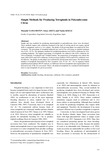Simple Methods for Producing Tetraploids in Polyembryonic Citrus
Japan Agricultural Research Quarterly
| ISSN | 00213551 |
|---|---|
| NII recode ID (NCID) | AA0068709X |

Full text
jarq58-2_113-119.pdf1.18 MB
Simple and easy methods for producing autotetraploids in polyembryonic citrus were developed. These methods require only colchicine treatment at the time of sowing and do not require special skills or equipment, such as in vitro culture. The ploidy of all growing plants was analyzed by flow cytometry. The percentage of tetraploid induction per seed in five accessions at optimal treatment was 11.0% - 42.5%. The optimum condition for tetraploid production was 0.005% colchicine for 24 h, excluding Kabuchii. The highest percentage of tetraploids was induced with 0.01% colchicine for 24 h in Kabuchii. In Kabuchii and ‘Yoshida Ponkan,’ the proportions of tetraploids were almost the same with 0.005% and 0.01% colchicine. In all accessions studied, 0.002% and 0.02% colchicine were not effective. The ploidy of some plants was confirmed by chromosome observation. The chromosome numbers of tetraploids determined by flow cytometry were 36 (2n = 4x = 36). In sequence-related amplified polymorphism (SRAP) analysis, no difference between tetraploids and original plants was detected in any of the five accessions. Hence, all analyzed tetraploids are considered autotetraploids (true-to-type tetraploids of a given accession).
| Date of issued | |
|---|---|
| Creator | Masashi YAMAMOTO Seiya ARITA Naoko KOZAI |
| Subject | breeding chromosome colchicine flow cytometry polyploid |
| Publisher | Japan International Research Center for Agricultural Sciences |
| Received Date | 2023-05-15 |
| Accepted Date | 2023-08-21 |
| Available Online | |
| Volume | 58 |
| Issue | 2 |
| spage | 113 |
| epage | 119 |
| DOI | 10.6090/jarq.58.113 |
| Language | eng |
